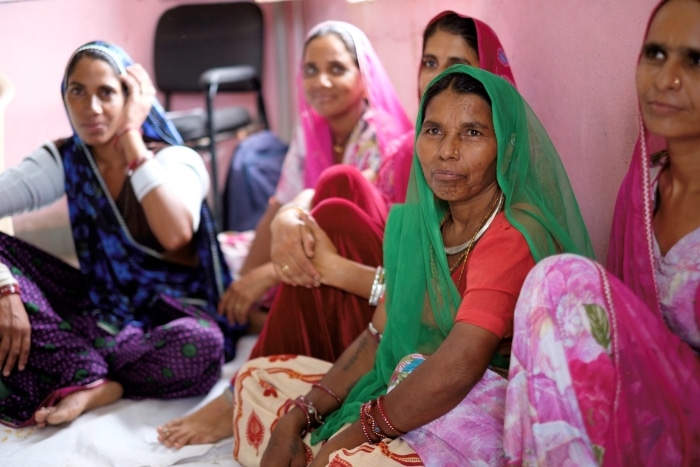Each March, the international community comes together in conversation to celebrate the progress made in women’s empowerment and advocate for increased action on gender equality. Because, as we all know, when women are mobilized, development interventions are significantly broader reaching and more sustainable. The very first pillar of our methodology at The Hunger Project is “Start with Women,” and we are proud to add our voice and share our experiences at these events each year. This year in particular, we made it a priority to elevate the stories of women living through the pandemic. Women around the world have been disproportionately affected by restrictions and reduced resources—conditions that threaten to roll back decades of progress for women’s empowerment. Here are highlights from two of these global conversations.
UN Commission on the Status of Women
The UN Commission on the Status of Women (CSW) is the principal global intergovernmental body dedicated to the promotion of gender equality and the empowerment of women. This two-week Commission brings together voices from every sector of development to identify what’s working and, importantly, what isn’t in the pursuit of gender equity. Anna Slattery, Global Office Communications Officer, Global Office, represented The Hunger Project at CSW and provided an official interjection during the interactive dialogue, “Building back better: Women’s participation and leadership in COVID-19 response and recovery.”
Slattery emphasized the importance of investing in women’s leadership and working with communities to break down barriers to women’s participation in public life, saying, “It takes time to cultivate strong leaders at the grassroots-level but, as this year has proven, the investment is critical for ensuring the resilience of rural communities.”
Generation Equality Forum
Following the two-week Commission, UN Women and the governments of Mexico and France hosted Generation Equality Forum (GEF), a global gathering that aims to secure concrete, ambitious and transformative commitments to achieve progress towards gender equality. The Hunger Project showed up powerfully in the dialogues at GEF. The team from THP-Mexico played an especially integral role in shaping the agenda and the government of Mexico’s platform, taking on a leadership role within the Civil Society Advisory Group.
Veda Bharadwaja, Senior Program Officer for THP-India, spoke on one of the thematic panels, “The Economy. The Crisis of Economic and Global Development Models and their Impact on Women and Girls, with Focus on the COVID-19 context,” where she shared insights about how the pandemic is shaping economic opportunities at the hyper-local panchayat-level.
The THP-Mexico team also co-organized two incredibly important spaces to elevate the voices of women, youth and indigenous people. The first was the National Meeting of Rural, Indigenous and Afro-descendant Women. More than 80 rural and indigenous women participated, defining their priorities as a social movement to influence the Mexican agenda at GEF.
Our work in Mexico.
Poverty rates in indigenous communities are disproportionately high, when compared with non-indigenous communities. Coupled with a highly patriarchal social structure, indigenous women have the least power and least access to productive resources. In 2020, we began piloting a new approach focused on partnership and advocacy that will bring entire municipalities to self-reliance. Learn more about our programs in Mexico here.
Read about THP-Mexico’s COVID-19 response here.
The second was a partnered session with Girls Not Brides, Save The Children, Women Deliver, International Planned Parenthood, Plan International and the Adolescent Girls Investment Plan. Together, we created a space for adolescents and young people to meet, dialogue and build advocacy strategies, not only for GEF, but beyond. It was an enlightening session about how to best include youth perspectives and voices in international conversations and the critical things we must keep in mind, such as working around school schedules, when working with youth.
Finally, Myrna Cunningham, a prominent voice for indigenous people’s rights and a member of our Global Board of Directors, spoke on a panel called, “The Crisis of the Human Rights of Women and Girls, including in the COVID-19 Context and the issues of Migration, Social and Racial Justice.” She spoke about the importance of promoting the political participation of women and marginalized groups—groups such as rural women, indigenous peoples and youth LGBT. She also spoke to the importance of community involvement in the political decisions of governments. Cunningham made it very clear that we must decolonize feminism and social movements, since it is the only way for indigenous, black, rural movements and communities, young women and vulnerable groups to truly participate.
We are proud to share our experiences and insights at events like GEF and CSW. Every session is a valuable opportunity to elevate the voices of those who don’t traditionally have a seat at the table—and it’s only with those voices that we’ll make sustainable progress towards a hunger-free world.
Advocating for women's leadership.
To learn more about the types of commitments and initiatives that we advocate for during these important international gatherings, check out our latest white paper, which includes key recommendations for mobilizing women for transformational change. This piece was written by a cohort of THP team members from around the world, and draws on our diverse experience in the programmatic and advocacy spaces.

